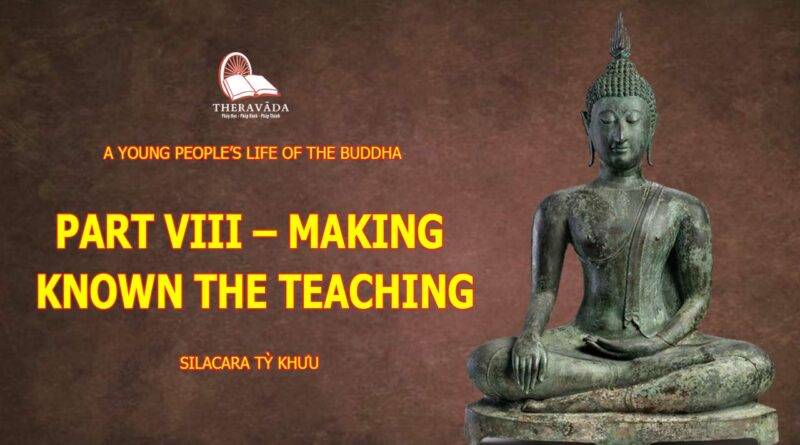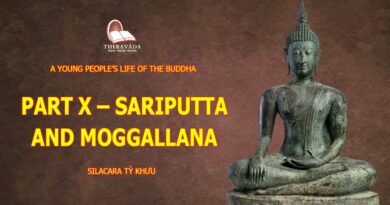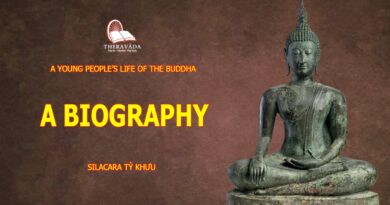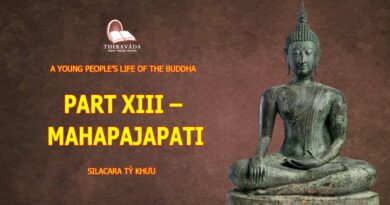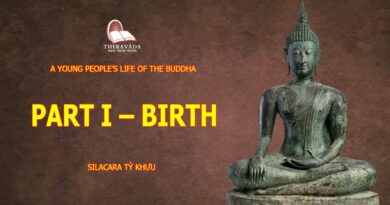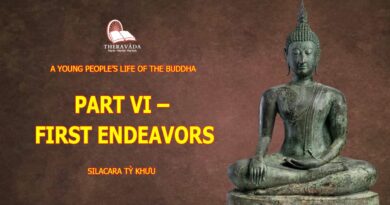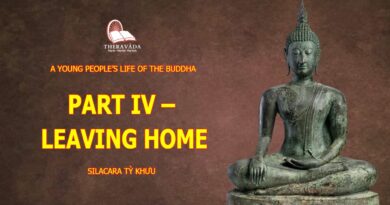A YOUNG PEOPLE’S LIFE OF THE BUDDHA: PART VIII – MAKING KNOWN THE TEACHING
As a man who long has struggled to swim across a wide and stormy water and at length after much effort reaches the safe shore, lies down awhile to rest his wearied limbs and look back with satisfaction on the dangers he has safely passed, as a man who has climbed into the cool pleasant air of a high mountain slope, when he gets there turns round, pleased and contented, and looks down upon the hot, dusty plain whose stifling air he had left behind, so now, his long toil past, his labors successfully accomplished, there in the quiet wood of Uruvela the victor in this fierce fight, rested Himself for a time, enjoying the relief of release from toil and labor, tasting in peace well-won, the fruits of truth and knowledge He had gained. Then having rested Himself sufficiently beneath the tree of victory, Siddhattha Gotama, now and henceforth Gotama the Buddha, passed from under that tree and went towards another near by under which the goatherds of the place were accustomed to take shelter from the sun while they watched their flocks.
As He sat resting here, a Brahmin happened to come past that way, and after the usual greetings to the ascetic under the goatherd’s tree, he said to Him, “Gotama, what makes a man a real Brahmin? What qualities does he require to possess in order really to be a man of the highest caste?”
And the Buddha, taking no notice of the proud Brahmin’s rudeness in addressing Him by His family name of Gotama without any title of courtesy before it such as “reverend Sir,” or the like, pointedly replied to him in this verse:
“The Brahmin who has put away all evil, Has put off pride, is self-restrained and pure, Has learning, follows out the Holy life, He alone has the light to be called Brahmin, He nothing has to do with worldly thing.”
And the Brahmin went away muttering to himself: “This ascetic Gotama knows me, this ascetic Gotama knows me.”
A few days after this, while the Buddha was still staying under the goatherd’s tree, two merchants who were going about the country selling their wares, came along the road, and seeing the ascetic sitting there under the goatherd’s tree so calm and content, enjoying its fruits in the peace and quietude it has brought him, they offered Him an offering of the best food they had, and struck by His noble and majestic look, asked Him to accept them as believers in Him. These two merchants, whose names were Tapussa and Bhallika, were thus the first persons in the world who became the followers of the Buddha Gotama.
But now, having rested long enough, the Buddha began to think about what He should do next. He had found the Truth He sought, and now it seemed to Him that He ought not to keep such precious knowledge to Himself, but that He ought to tell it to others, so that they too might taste the comfort it brought. This was what He thought at first. But then other thoughts came into His mind.
“This doctrine of mine is not a very easy doctrine to understand,” he said to himself. “It is deep and subtle. Only the thoughtful and reflective can grasp it fully so that it will do them good. But there are not many men who are thoughtful and reflective. The great majority of men do not want to take the trouble to think and reflect. They want something easy; something that will amuse and entertain them. Their minds are inclined only to what promises to give them pleasure and delight. They are altogether given over to love of pleasure. If I were to preach this doctrine to them, they would not know what I was talking about. They would not pay attention to me. I should only be giving myself trouble all for nothing.”
Thus did the Buddha consider within himself almost making up his mind not to tell the Truth He had found to anybody, but just to keep it and enjoy it by Himself, since it did not seem to Him that anybody else in the world would want to hear it or thank Him for telling them.
However He did not stop at this point in His reflections or else the world would not know as it does to-day, the Truth He taught. He went on to consider the matter further; and this is what He next thought:
“Yes, it is true that most of the people in the world, will not want to hear this Truth I have found, and would not understand it even if they did hear me tell about it, they are so fond of what is easy and pleasant and comfortable and costs them no trouble. But still, everybody in the world is not alike. There are sure to be some, not very many, but still some who are not satisfied with the way they are living now, who want to know more than they know now, who are not content to follow pleasure wherever it may lead them. What a pity it would be that I should know this Truth which would bring to these few comfort and happiness, if only they heard it, and yet never give them a chance to hear it! No, I shall not do like that. I shall go forth now and make known, to all men I meet, these Four Noble Truths, these Four Great Facts I have discovered, of Ill, and its Cause, and its Cure, and the Way in which it can be cured; and among the many I speak to, there will always be a few who will listen, and listening, understand me.
“Just as in a lotus pond where all kinds of lotus lilies are growing, pink and blue and white, many of them have grown only a little way about the muddy bottom of the pond; and some have grown half way up through the water; and some have reached the top of the water and rest there; but a few grown up so as to lift their blossoms right out of, and above the mud and water, into the open air and the sunshine. So there are some beings whose minds are much sunk in the mud of passions and desires; and there are some that are not so much sunk in that mud; while some, a few are only a little touched with the mud of passion. These last will be able to understand my teaching when they hear it. I will let them hear it. I will go forth now and preach it to all men everywhere.”
And then the Buddha began to consider who would be the best people to whom to tell His doctrine first, who would be the most likely to listen to Him and quickly understand what He said.
Then He thought about His old teacher Alara Kalama, and how learned and thoughtful, how quick in the brain, how pure in his life he was. And He said to himself: “I will go and tell Alara Kalama first. He will very quickly understand.”
But as He was getting ready to go to Alara Kalama, some one came and told Him that Alara Kalama was dead. The Buddha was very sorry to hear this, for He felt sure that so good and so wise a man as His old teacher would have been sure to understand His doctrine as soon as he heard it. Then He began to think who else there was who would be likely to understand His doctrine. And the thought came to Him that perhaps the other teacher He had studied under in former days, Uddaka the disciple of Rama, would be a good person to whom to tell it, for Uddaka too, like Alara Kalama, was quick to understand anything new when he was told it. But when He made enquiry where Uddaka was staying, then He learned that he had died just the night before.
So once more He had to consider who among all those He once had known, would be most likely to listen to Him and understand the Truth He wanted to tell them. And then He remembered the five hermits who had waited upon Him and attended to Him so faithfully during the time when He was striving by Himself at Uruvela. After enquiring where they had gone to when they had left Him, He learned that they were staying in a deer-park near the city of Benares. So, rising up and leaving Uruvela, the Buddha set out to walk to Benares, about a hundred and fifty miles away, to find His former attendants and disciples and tell them what He had found. And wandering on day after day from place to place, at length one evening He drew near to the grove in the deer-park where those five ascetics were staying.
And they say Him approaching in the distance, and said to one another:
“Look yonder! There is that ascetic Gotama coming here — a luxurious fellow who gave up striving and fell back into a life of ease and comfort. Don’t let us speak to Him! Don’t let us show Him any respect! Let nobody go and offer to take His bowl or His extra robe from Him. We’ll just leave a mat there for Him to sit on if He wants to, and if He doesn’t want, He can stand. Who is going to attend on a good-for-nothing ascetic like Him!”
However, as the Buddha came nearer and nearer, they began to notice that somehow He was not the same as He used to be in the days when they had lived with Him and studied under Him. There now was something about Him, something noble and majestic, such as they never had seen before. And almost in spite of themselves, before they well knew what they were doing, they had forgotten all they had just agreed on as to how they were going to receive Him. And one was hastening forward to meet Him, and respectfully taking His bowl and robe from Him, another busily preparing a seat for Him, while a third hurried off and brought Him water for His feet.
Then, after He had taken the seat offered Him, the Buddha spoke to them and said:
“Listen, ascetics. I have found the way to deathlessness. Let me tell you. Let me teach you. And if you listen and learn and practice as I instruct you, very soon you will know for yourselves, not in some future life but here and now in this present lifetime that what I say is true. You will realize for yourselves the state that is beyond all lives and deaths.”
Naturally the five ascetics were very much astonished to hear their old master and teacher talking like this. They had seen Him give His hard life of going without proper food and rest; they had seen Him cease, as they thought, from all efforts to find the Truth, and here He was actually coming to them and telling them that He had found the Truth! They simply did not believe Him; and they told Him so.
“Why, friend Gotama,” they said, “when we were living with you, you practiced all sorts of stern austerities and bodily mortifications such as were practiced by no other ascetic we ever heard of in the whole of India, and that was why we took you for our master and teacher. Yet with all you did, you never found out the Truth you wanted to find. How is it possible you can have found it now when you are living a life of luxury, have ceased from striving, and turned to live in ease and comfort?”
But the Buddha replied: “You are mistaken, ascetics. I have not given up all efforts. I am not living a life of self-indulgence and idle comfort and ease. Listen to me. I really have attained supreme knowledge and insight. And I can teach it to you so that you also may attain to it and possess it for yourselves.”
But still the five ascetics could not believe what their old teacher now was telling them. It seemed to them impossible that such a thing could be true, even though He begged them once more to listen to Him and believe what He said.
Then when He saw that they did not believe Him when He said He found the Deathless, He looked at them very earnestly, very seriously, and said:
“Listen, ascetics! In all the time that you used to be with me, did I ever say anything like this to you before? Did I ever before tell you that I had found the supreme knowledge and insight that leads beyond birth and death? Come, answer me!”
The five ascetics had to answer the Buddha that it was true He had never said anything like this to them before.
“Very well,” urged the Buddha. “Listen to me now when I tell you that I really have found the way to deathlessness. And let me show you what I have found.”
So gravely and impressively did the Buddha speak these words, so gravely and impressively did He look at them as He spoke, that the five ascetics found themselves unable any longer to refuse to listen to Him. They invited their old master and teacher to stay with them and teach them. So, day after day, during the next few months, the Buddha taught these five old disciples of His, the new Truth He had discovered. First He taught two out of the five, while the other three went out with their begging bowls to the city, and collected enough food for the whole six of them. Then these three stayed at the deer-park and were taught by the Buddha while the other two went out begging and brought back sufficient for them all. Thus the little party of the five pupils and their teacher lived happily together, He teaching, the other five busily learning and practicing, until in a short time (for they were all diligent pupils, and they had the best master and teacher in the world) the whole five of them, one after another, reached and realized for themselves the Truth their Master had found. They came to know even while alive in this body, the state that is called Nibbana.
Out of these five ascetics, the one who was the first thus to learn and realize for himself what his Master taught, was called Kondanna. The names of the other four were, Bhaddaka, Assaji, Vappa, and Mahanama. These five ascetics were the first five Arahans that appeared in the world; for Arahan is the name that is given to one who in this life, in the body he now is in, comes to realize the state that cannot be touched by birth and death, the state that is called Nibbana. These five Arahans were the first members of the Sangha or Brotherhood of Bhikkhus who acknowledged the Buddha as master and teacher and guide for all their life.
While the Buddha thus was staying in the deer-park at Isipatana, there came to see Him a rich young man of the neighborhood called Yasa. And after the young man Yasa had heard the Buddha explain his teaching and what it led to, he was so well pleased with what he heard that he became a Bhikkhu there and then, and stayed on with the Buddha in order to hear and learn more.
But towards evening that day an elderly man came to where the Buddha was, and told Him that his son had left home that morning saying he was going to visit the Buddha, but he had not come again, and his mother was crying for him thinking that he must have been killed by robbers on the way. Then the Buddha told the man that his son had become a Bhikkhu; and He began to explain His doctrine to the new Bhikkhu’s father. And so well did He speak that when He had ended, the father also asked to be allowed to become a Bhikkhu, the same as his son had done; and he too, stayed with the Buddha and did not return home. And next morning, when the Buddha and the new young Bhikkhu went to his mother’s house for food, she was quite pleased to learn that her son and her husband had become disciples of so great a teacher, and she herself became a lay-follower of the Buddha.
After this, four close friends of young Yasa, when they saw what their companion had done, also did the same, and became Bhikkhus also, disciples of the Buddha Gotama, members of His Sangha. And in this way, more and more young men became Bhikkhus, until at last the Buddha had gathered round Him there at Isipatana, a body of about sixty young Bhikkhus, all of the best families, and all of them eager and diligent in study, and strenuous and persevering in practice under their Master’s training, so that in no very long time, all of them had realized for themselves the supreme knowledge and insight, and become Arahans.
But the Buddha did not allow them to stay there with Him. Now that they had learned all He had to teach, He told them that now they must go out and teach others, so that these others who were ready to accept His teaching, might hear It and learn It, and be saved from all trouble and distress.
“Go forth,” He said to them, “and make known the Teaching which is excellent in its beginnings, excellent in its progress, and excellent in its goal. Proclaim the perfect life, holy and pure. There are in the world beings not altogether blinded with the dust of passion and desire; and if they do not learn my doctrine, they will perish. They will listen to you: they will understand.”
And the Buddha sent out these first sixty disciples, not in pairs nor in groups of three or four. He sent them out one by one, and each of them in a different direction, so as to make sure that His teaching should be spread as far and wide as possible. And these sixty Arahans did as their Master told them to do, and carried a knowledge of His Teaching and Discipline, North and South, and East and West. They were the first men in the world who went abroad into foreign countries for the sole purpose of spreading a knowledge of the religious truth they believed in. They were, in fact, the first duly appointed missionaries of a religion the world has seen.
And they were brave men, these first missionaries of the Buddha’s religion.
One of them came to the Buddha and told Him that he wanted to be sent to a certain country where everybody knew the people were very wild and rough.
“But what will you do there, Bhikkhu,” said the Buddha, when He heard his request, “if the people of the country abuse you and say all sorts of bad things about you.”
“Then,” answered the Bhikkhu, “I shall say to myself: ‘These people are very good people; they only use their tongues to me; they do not beat me with their fists.'”
“But suppose they beat you with their fists, Bhikkhu, what will you do then?” asked the Buddha.
“Then I shall say to myself: ‘These people are very good people; they do not thrash me with sticks,'” replied the Bhikkhu.
“But if they thrash you with sticks, what then?”
“Then I shall say that they are very good people; they do not cut me with swords.”
“And if they cut you with swords?”
“Then I shall say they are very good, they do not kill me.”
“But if they make to kill you, O Bhikkhu; what will you do then?” said the Buddha.
“Then Lord,” said the Bhikkhu calmly, “I shall say to myself: ‘These people are doing me a great favor, for this body of mine is an evil thing of which I shall be glad to be rid; and these good people are going to rid me of it.'”
Then the Buddha said:
“Go O Bhikkhu, and make known my Teaching among these people. Bhikkhus like you are the proper kind of Bhikkhus to publish abroad my Doctrine among all the peoples and nations of the world.”
Source: Budsas.net

